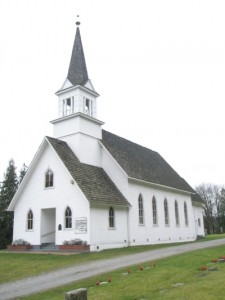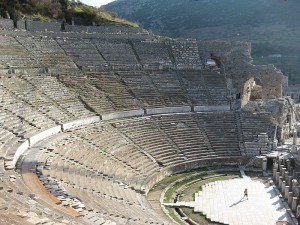 Recently there has been discussion among my friends as to what makes a Christian gathering an official “church meeting.” What makes a church, church?
Recently there has been discussion among my friends as to what makes a Christian gathering an official “church meeting.” What makes a church, church?
A bit tongue-in-cheek, the following quote may be a good place to start:
“The image of much of contemporary Christianity can be summarized, a bit euphemistically, as holy people coming regularly to a holy place at a holy day at a holy hour to participate in a holy ritual lead by a holy man dressed in holy clothes against a holy fee.” (Wolfgang Simpson)
The first verse that comes up in connection with this topic is generally Matthew 18:20, ”For where two or three come together in my name, there am I with them.” Invariably someone will point out Jesus made this statement in the context of disciplining a fellow brother and not in the context of a local church. My personal opinion is that – regardless of the context – Jesus said it.
As I’ve begun looking at this topic it has surprised me to see how large a role semantics plays into the discussion.
Let’s start with the word, “church”. Found in the New Testament over 100 times, the underlying Greek word is Ekklesia. The literal meaning of Ekklesia is “called out.” A direct translation of Ekklesia into modern English would render, “congregation,” or “assembly.” Not the old ecclesiastical word “church.”
Of note, the first Bible translated into English, the Tyndale Bible (1526), used the word “congregation” for Ekklesia. It wasn’t until later in the Bishop’s and King James Bibles the word Ekklesida was translated “church” instead.
In fact, when King James commissioned his translation, he made it a rule that the translators had to use the word “church”:
“The Old Ecclesiastical Words to be kept, viz. the Word Church not to be translated Congregation &c.” (one of 15 rules King James had regarding the translation project)
Of course this rule raises the question, what was the motive? Why didn’t King James let Ekklesia be translated correctly (clearly)? Though it is hard to say exactly why today, a possible explanation is that the word “congregation” or “assembly” undermined the authority of a global church hierarchy and structure as was in existence in the Catholic & Anglican establishments of the time. The word “assembly” implies a local, autonomous, independent gathering, not a rigid system of centralized power coming from the likes of a King or Pope.
Though in modern translations of the New Testament the word “church” is still the most common translation of the word Ekklesia, there is at least one instance in the Bible where nearly all translators still translate the same word “assembly” instead. That is found in Acts 19 where there we find a great uproar in Ephesus precipitated by a jealous craftsman named Demetrius who fashioned silver idols. Because he was losing business due to Christian converts, Demetrius incited the city against Paul. 
Acts 19:32, “The assembly was in confusion: Some were shouting one thing, some another.” When the noise settled down, the city clerk addressed the crowd, finishing with, “’If there is anything further you want to bring up, it must be settled in a legal assembly.’ … After he said this, he dismissed the assembly.” (Acts 19:39 & 41)
The idea is that everyone was “called out” from what they were doing and assembled at the theater – in this case for a riot. It can be seen from the context of this story that the word Ekklesia in those times referred to a gathering, an assembly. Like in High School, sometimes there is an interruption in the scheduled class routines where students are “called out” to attend an “assembly,” a meeting for some purpose like a pep rally, fund raiser, or speech by the class president.
So semantics is important. Nowadays the word “church” usually doesn’t primarily conjure up the idea of a “group assembly” but rather things like a church building, a church service, the universal church, the Roman Catholic Church, or even a distinction from the State (as in the phrase “Separation of Church and State”).
Answering the question, “What makes a church, church,” is a biggee.
Continue on to Part 2 of What Makes a Church a Church